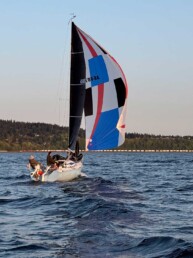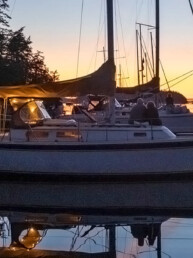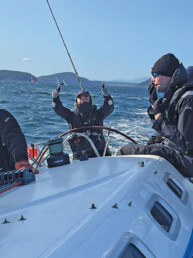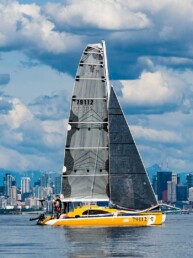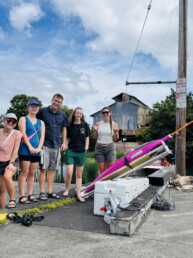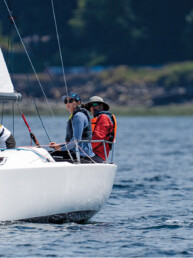In our latest Throwback Thursday, were are reminded that, on a boat, some of the simplest days can turn into the hardest.
“It’s going to be a clear short trip tomorrow, we don’t have to rush in the morning. It will be easy.” I told my wife, Beth, the day before making a stop in Bella Bella, British Columbia.
I need to quit saying things like that. Nothing is ever easy on a boat — and our Norseman 535, Loki, is always listening.
After 12 years of living aboard Loki and replacing nearly all of her systems, our family of four knows her well. Yet, as with all boats, we expect the unexpected. Beth and I, along with our sons, 11-year-old Logan and 3-year-old Solomon, learned this lesson again while in the midst of a spring cruise up the Inside Passage to Alaska.
The following morning was much calmer than the previous day, and exiting Kwakume Inlet was not as daunting as the entrance had been. Fitz Hugh Sound had become much more bearable, and we continued our way north again. The wind began picking up out of the northeast when we neared Burke Channel and noticed that these long channels seem to create their own wind tunnels.
Not more than 10 minutes later, we heard heavy clunk, bang, whacking sounds, along with a tremendous amount of vibration underneath our feet — what was happening? I took the engine out of gear, pointed Loki into the wind and in a flash, Beth pulled out our in-mast furling mainsail. As she did, I unfurled the headsail and we started beating into the wind trying to make our way north.
With Loki under sail now, we turned off the engine to assess what was happening and gather our frayed wits. The adrenaline was pumping hard and we realized we had to figure this out on our own and underway. Tacking east, then northwest and back again, we made slow progress north. After an hour or two of beating to weather, the breeze began to calm — 12, 10, 9, then 7 knots of wind, which brought our progress to a crawl. Coupled with the oncoming tide, we began to slide back down the sound. The thought crossed my mind, “Do we go back?”
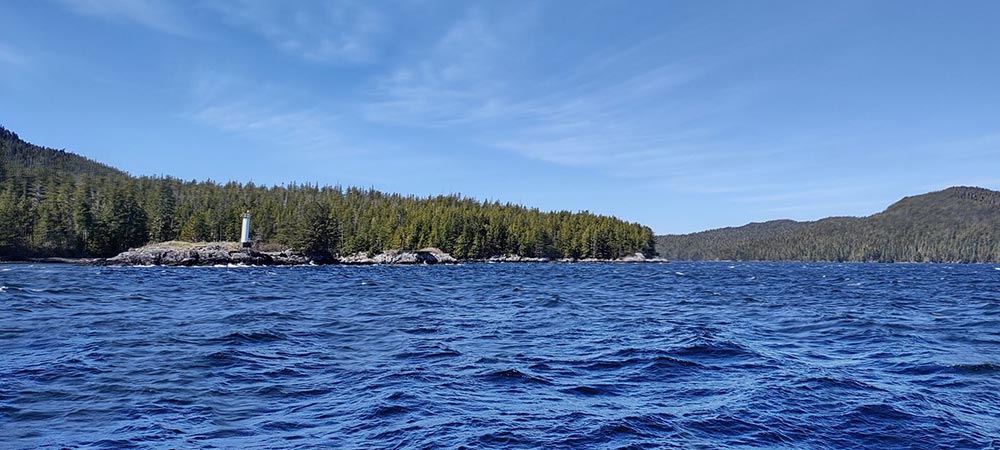
No, we couldn’t. It would be farther back to Port Hardy and we didn’t want to backtrack around Cape Caution. We would have to find a way to make it to Bella Bella to hopefully find a diver. Or one of us would have to don the 7-mm wetsuit and go in ourselves.
Not finding anything wrong with the transmission and with the wind dying, we decided to start the engine again to see if we could limp north. We crossed our fingers and took a deep breath. The engine clicked on instantly, and we held our collective breath and put it in forward. The gear engaged and there was no clunking!
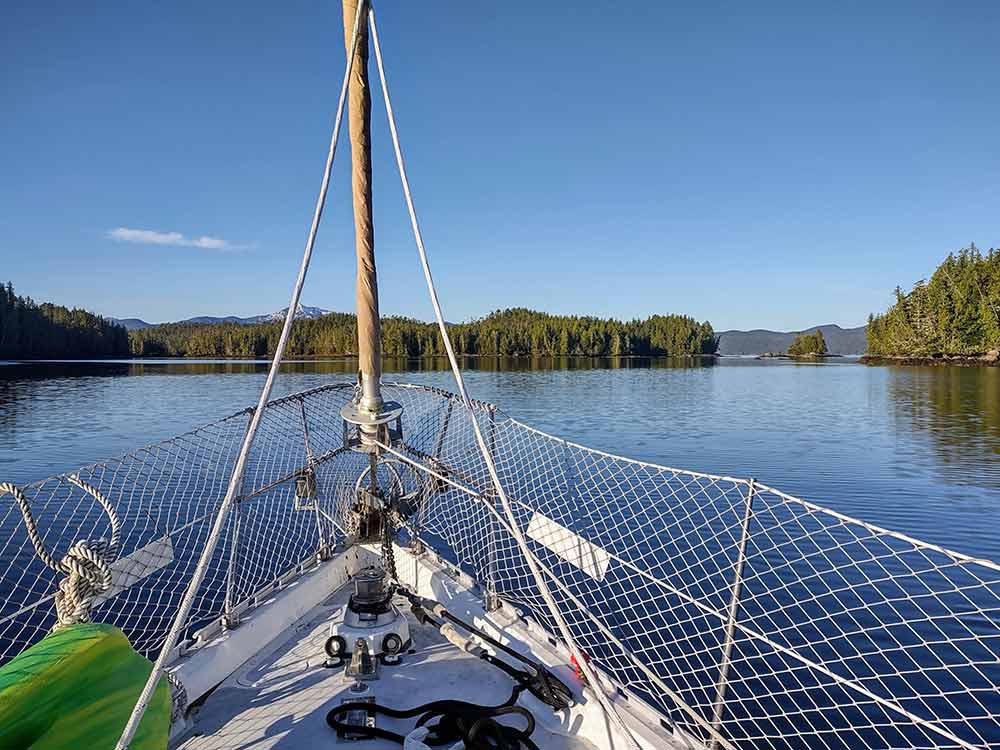
Not wanting to take any chances, we furled in the headsail and pointed north, slowly making our way against the current at about 4 knots. Curious to see if we could make better time, I pushed the throttle up to 1500 rpms — there was a new vibration below us, but the clunking had stopped. Then, when I nudged the boat ahead some more, the prop started making a thunking noise, so I quickly backed down to 1500 rpms, which moved us ahead at about 6 knots. It wasn’t going to be a fast ride, but we could make it.
Almost within a half hour of the engine working again, the wind started to pick up and it was, of course, directly on our bow. Onward we plodded, and about two hours later we made the turn west around Bickford Rock. As we neared the rocky point, a few thumps below reminded us to stay on our toes. We headed west through Lama Passage and the north wind was blocked by Denny Island. The water calmed, and off in the distance we saw the spout of a whale. All those terrifying moments melted away to amazement as we saw another spout and then the large tail of the humpback rise above the water and slip quietly into the depths.
Lama Passage turned to the north and in the distance, we could see the town of Bella Bella. Our plan was to anchor near Shearwater Resort, which has a marine store and shipyard, and sort things out. As we motored through the harbor toward the resort, we noticed the depth was approximately 70 feet throughout. Typically, this would not have given us pause to drop the hook, but with the day’s events, we decided to radio in and stay the night at the dock. We needed a break.
The dock was mostly empty except for our friends on Some Day and a couple other boats. It was a relief to tie up and have a reset. Before we could truly relax, though, we needed to dive the prop and assess if something was wrapped around the propellor shaft. As with most unpleasant chores aboard Loki, the person who loses the tried and true game of Rock, Paper, Scissors would be the diver. Best out of three.
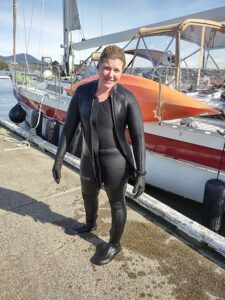
Beth won the first round and I pulled off the improbable comeback. She would be going for a swim! She needed to dance into the wetsuit and mentally prepare for the dive, so I headed up to the marina office to pay the night’s moorage. When I returned, Beth was ready in the wetsuit and was looking very pensive about jumping in the cold water. As she steeled herself, half a dozen men in two fishing boats pulled up and wanted to give her pointers on going under the boat. She didn’t want to hear it.
On went the mask and in went Beth. The cold water seeped into the suit and after a few quick breaths, she was ready to go under. She took a deep breath and down she went under Loki. I was surprised at how long she managed to stay down, especially without a diving hood. Beth emerged 20 seconds later, took a big gasp of air and said nothing was wrapped on the prop, but she felt like she had the biggest ice cream headache. I asked her how the prop looked and she said everything seemed normal. The prop turned with no problem and there didn’t appear to be any nicks or dings on the blades.
Very odd, or as Logan aptly put it, “It’s just Loki being Loki!”
The next day, we pulled off the dock and headed north between Saunders and Meadow islands. I reluctantly pushed the throttle forward to 1800 rpms and there was one short clunk, but aside from that, Loki was behaving.
Later, after hauling the boat out in Alaska to survey what had happened, we realized that the stationary blade on the prop’s line cutter had dislodged and was hitting the other blade, which was making that tremendous racket. We’re not sure why — perhaps it was old age, or maybe we had snagged a line. Either way, we needed a new sleeve to keep the two blades apart.
Lesson learned: Never let the boat hear you say “easy.” It may have other plans
Mike Miller holds a 100-ton captain’s license and has been sailing since he was little. He and Beth have been living aboard since 2007. They have two wonderful boys, Logan and Solomon, who have grown up on Loki and constantly teach them to live each day to the fullest. Follow their adventures at www.travelingloki.com.

